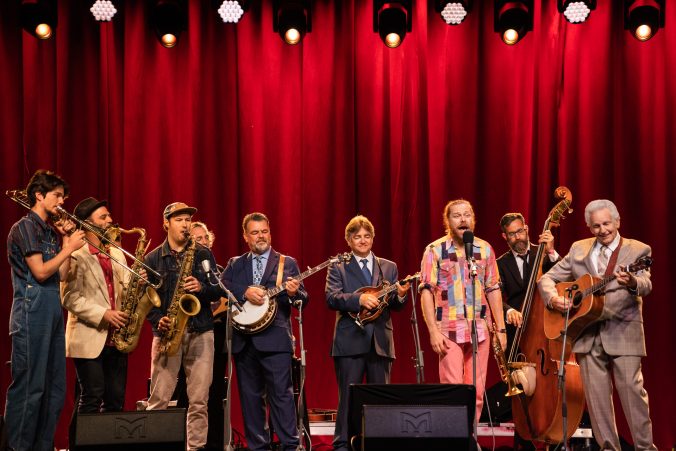The California Honeydrops Bring the Catharsis of Joy
Photos by Marc Shapiro & J. Strausser, courtesy of IVPR
The California Honeydrops aren’t famous yet, but they promise to be one of the most exciting bands on the concert circuit this summer. They proved as much when they brought their horn-fueled form of Southern Soul and New Orleans funk to Delfest, the annual Memorial Day Weekend festival hosted by bluegrass legend Del McCoury. Again and again the Honeydrops confronted the challenges of life in the 2020s and provided a joyful catharsis.
As their name implies, the California Honeydrops aren’t from the American South; they’re based in Oakland. Moreover, Lech Wierzynski, the band’s lead singer and chief songwriter, is a Polish immigrant. This double remove from the music they love gives them a different take on a tradition worn down by oldies nostalgia and troubled history. The band redeems this legacy by filling it with an optimism that is more than just an attitude; it’s an approach to craft as high in its standards as in its hopes.
“Like most immigrants,” Wierzynski says, “I had one foot in each culture. We never spoke English at home, but I grew up on American radio. The advantage I had was I could hear it from another perspective. To an outsider like me, all American music seems very similar. Bluegrass and R&B might seem different if you’re American, but to me they have many more similarities than differences.”
During the California Honeydrops’ Friday night set at Delfest, Wierzynski reached back to one of his earliest compositions, “Cry for Me.” He had written it for Fran Dincin, the Chicago woman who welcomed the Wierzynski family when they first arrived in the U.S. It was Dincin who encouraged young Lech’s artistic curiosity, which led to his life as a musician. When she died in 2005, he was staggered, but he responded in classic New Orleans fashion by celebrating the life rather than mourning the death.
“I wanted to write a sad song,” Wierzynski recalls, “but that didn’t seem fit the joy she had brought into my life. Thanks to her I was set on a different path, so the song was as much about me as her. It’s good to have a crazy aunt or crazy uncle who can give you some options. Maybe it’s not so good to have crazy parents.”
The California Honeydrops are a quintet, but they perform live as an octet. On “Cry for Me,” Wierzynski’s trumpet kicked off a carnival fanfare by the sax, clarinet, trombone and trumpet. New Orleans funeral processions are accompanied by slow, somber music on the way to the graveyard but by bouncy, celebratory music on the way back, and this was definitely in the latter category.
Wierzynski—sporting pink pants, a brightly colored quilt shirt and a thick orange beard—lowered his trumpet and contemplated his own death. “Oh when they bury me ‘neath the ground,” he sang in a subdued high tenor over the march beat. Ben Malament cracked the snare drum and then rolled triplets for a complementary syncopation, and Johnny Bones’ clarinet was swinging high and free. We were coming back from the cemetery now. “I want my people in the street all doin’ that second line beat,” Wierzynski called out, as the energy escalated, “and I don’t want no one to cry for me.”
“The second line is part of the music I love,” he explains, “and it was a great way to send Fran out. Everyone in the band loves New Orleans music; it’s as if we were all drawn to it instinctively. My dad was into Sidney Bechet, Kid Ory and Louis Armstrong, and I heard all those records growing up. ‘Muskat Ramble’ was ingrained in my brain.”
It’s very hard for a band from outside Louisiana to play the state’s music accurately—so much of the feel for that sound comes from absorbing it as a child in parades, funerals, festivals and street parties. Most outsiders are either too stiff or too sloppy. But the California Honeydrops are the exception that proves the rule. Moreover, they never get trapped in “the way it’s always been done,” as many in-staters do. These out-of-staters add both California looseness and jazz-musician chops.
“You can’t help but change the music,” he insists. “At home, I try to learn what’s on the record, but on stage it’s going to come out its own way. I like to combine things. I’ll hear a Don Williams country song, and I’ll say, ‘That would be a good R&B song.’ Or I’ll hear a Sam Cooke soul song, and I’ll say, ‘That would be a great country song.’ You don’t have to try to put your own spin on things; it just happens.”
Some acts recreate older music more successfully than others. It helps to have a healthy respect for the tradition but not too much respect. It helps to have original material that fits with the older songs and holds its own. And it helps to recognize that most vintage, working-class music is fundamentally dance music.
-

-

-

-

-

-

-

-

-

-

-

-

-

-

-

-

-

-

-

-

-

-

-

-

-

-

-

-

-

-

-

-

-

-

-

-

-

-

-

-









































